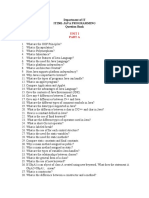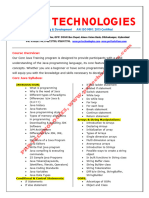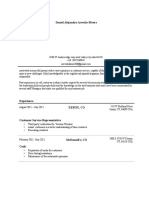0% found this document useful (0 votes)
40 views8 pagesJava VIVA Preparation
The document provides an overview of Java programming concepts, covering Java features, bytecode, data types, operators, control statements, arrays, strings, classes, inheritance, interfaces, exception handling, networking, IO streams, collections, multithreading, generics, and applets. It details the structure and functionalities of Java, including its object-oriented nature, exception management, and collection framework. Additionally, it explains the lifecycle of applets and the use of generics for type safety.
Uploaded by
csef006Copyright
© © All Rights Reserved
We take content rights seriously. If you suspect this is your content, claim it here.
Available Formats
Download as PDF, TXT or read online on Scribd
0% found this document useful (0 votes)
40 views8 pagesJava VIVA Preparation
The document provides an overview of Java programming concepts, covering Java features, bytecode, data types, operators, control statements, arrays, strings, classes, inheritance, interfaces, exception handling, networking, IO streams, collections, multithreading, generics, and applets. It details the structure and functionalities of Java, including its object-oriented nature, exception management, and collection framework. Additionally, it explains the lifecycle of applets and the use of generics for type safety.
Uploaded by
csef006Copyright
© © All Rights Reserved
We take content rights seriously. If you suspect this is your content, claim it here.
Available Formats
Download as PDF, TXT or read online on Scribd
/ 8






























































































